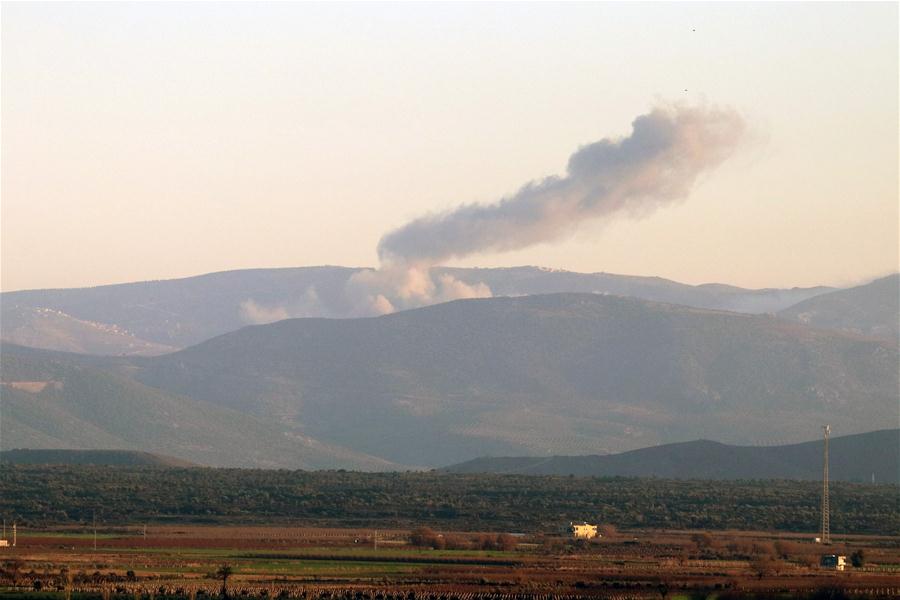
ANKARA, Jan. 20 (Xinhua) -- Turkey launched Saturday a new operation dubbed as "Operation Olive Branch" on the ground to oust Kurdish militia from Syria's Afrin, said the Turkish Armed Forces in a statement.
"Operation Olive Branch has started at 17:00 (1400 GMT) today" inside Syria, read the statement. The television footage was showing Turkish F-16 bombarding Kurdish positions inside Syria, several kilometers from the Turkish border.
The statement said Turkey is acting upon her right of "legitimate defense," but it is determined also to respect Syria's territorial integrity.
The Turkish army said that the aim of its operation is to clear Afrin "of all terrorists once and for good," citing Islamic State fighters (IS) as potential targets.
Observation points and a fuel depot have been targeted by air strikes near the Turkish border inside Syria, reported CNN Turk news channel.
Turkish President Recep Tayyip Erdogan said Saturday that Turkey had launched a new operation on the ground. "This will be followed by Manbij," he added, referring to another Kurdish-controlled Syrian town to the east.
The Turkish army has over the last two days shelled camps used by the People's Protection Units (YPG) militia in response to fire from the militia group, which Turkey sees to be a terror organization and am affiliate of the Kurdistan Workers' Party (PKK).
But the YPG has been the key ally of the U.S. in the fight against Islamic State(IS), playing a key role in pushing the extremists out of their Syrian strongholds.
Turkey from August 2016 to March 2017 pushed into Syria in its more than half-year Euphrates Shield operation in an area to the east of Afrin against both YPG and IS.
Syria's Deputy Foreign Minister Faisal Mekdad warned on Thursday that the Syrian air force could destroy any Turkish warplanes used in the new offensive.
Turkey's Foreign Minister Mevlut Cavusoglu talked on the phone on Saturday with his American and Russian counterparts, respectively Rex Tillerson and Sergei Lavrov, reported the local press.
Diplomatic representatives of the U.S., Russia and Iran, another player in Syria, have been summoned on Saturday evening to the Turkish ministry of Foreign Affairs, a Turkish diplomatic source told Xinhua.
Turkey's army chief General Hulusi Akar and Intelligence chief Hakan Fidan were in Moscow on Thursday for talks with Russian counterparts on Syria.
Russia is the Syrian's regime most powerful support and is present there with several army and air detachments as a key player.
The Turkish press reported just before the announcement of the launch of "Operation Olive Branch" that Russia had given Turkey green light to use the Syrian air space over Afrin.
Analyst have repeatedly indicated that Turkey would have to need Moscow's green light to launch an assault in Syria. There has been no official announcement so far from both parties confirming such a cooperation.
However, security expert Abdullah Agar said on the Turkish NTV news channel that the fact that Turkish war planes entered the Syrian air space on Saturday confirms that there is an agreement reached between Ankara and Moscow.
The Russian Ministry of Defense said in a statement that Russia was withdrawing troops from Syria's Afrin targeted by Turkish offensive.
"The command of the Russian group of troops in Syria has taken measures to ensure security of Russian servicemen located in the district of Afrin, where the Turkish Armed Forces launched a special operation against the Kurdish armed groups," read the statement.
The Russian Foreign Ministry stated on Saturday that Moscow was closely following the situation in Syria's Afrin and was concerned by the news about Turkish military engagement in the city.
Meanwhile, the Turkish threats of an intervention have also raised eyebrows in Washington, which has backed the YPG as it dislodged IS and gained control of the swathe of northern Syria up to the Iraqi border.
The YPG-held enclave of Afrin marks the westernmost extent of its control. Turkey wants to make sure it is kept well to the east of the Euphrates River.
Disagreement over the Kurdish fighters has created a sharp division between Turkey and the United States.
President Erdogan had reacted furiously this week to an announcement of plans to create a US-backed 30,000-strong border security force in northern Syria composed partly of YPG fighters, describing it as an "army of terror."
















